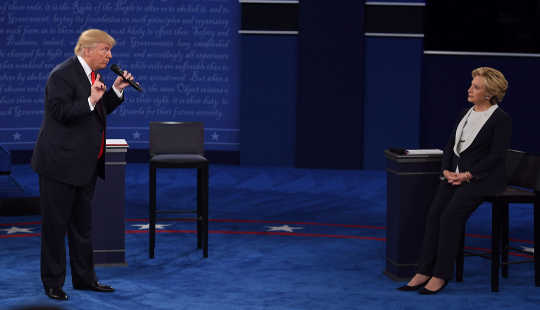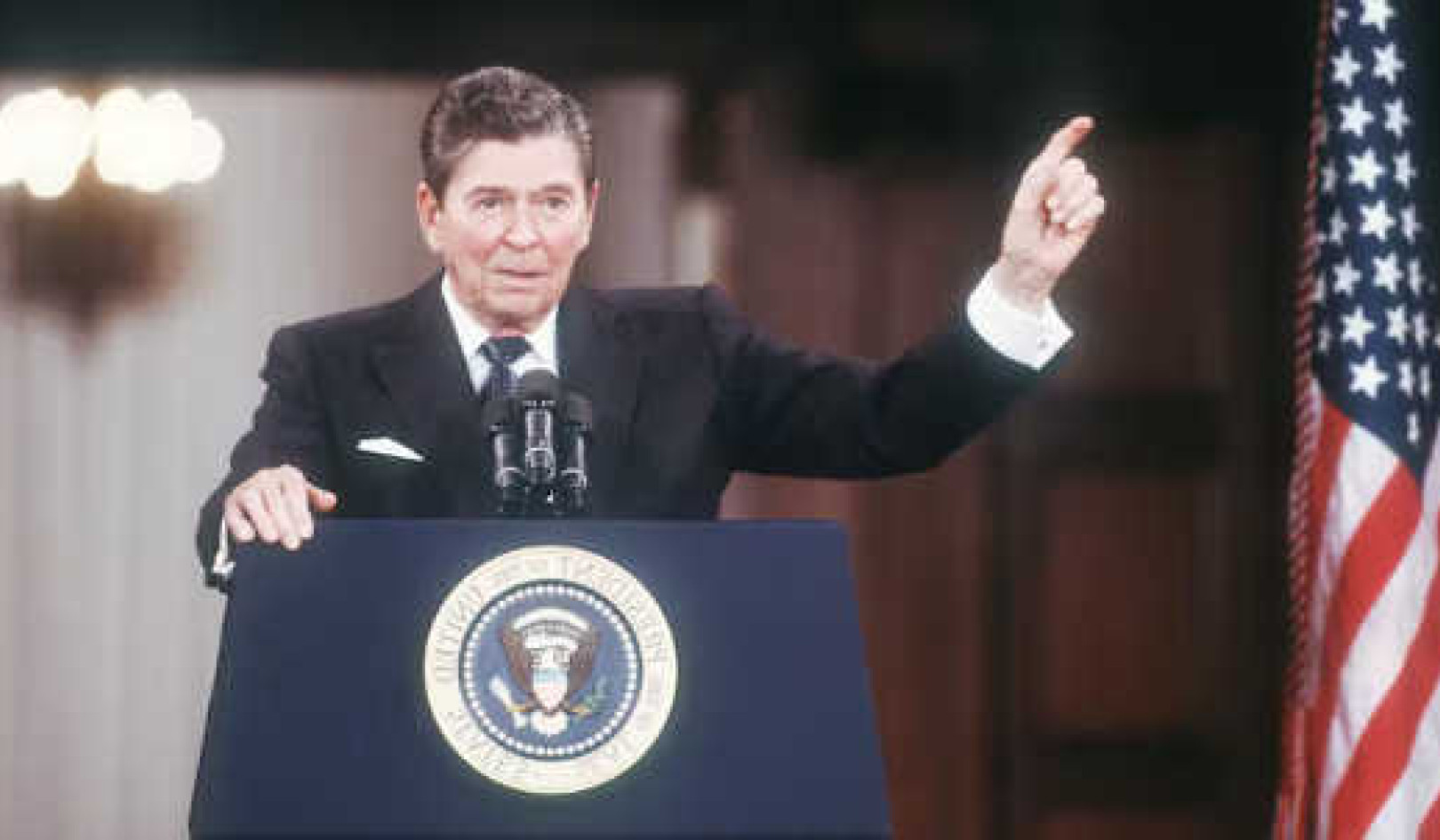
The second US presidential election debate was widely billed as a heavyweight bout. In the event it was a score draw – but the clear loser was the American political process.
This election continues to be a rollercoaster ride, with the American electorate by turns gripped and nauseated as events unfold. The two days leading up to the debate alone threw up more drama than most election cycles manage to generate in two years, with the media and pundit class near-hysterical in their excitement.
Normal political discourse was fully abandoned little more than 48 hours before the debate began, when a video emerged of Trump describing how stardom empowered him to sexually assault women with impunity. The ensuing political and media storm reached a fever pitch just an hour before the debate, when Trump staged a press conference with three women who claim to have been sexually molested by Bill Clinton. Trump then brought them to the debate with him. Forget the boxing metaphors; this was presidential debate as reality television.
The debate used a so-called “town hall” format discussion, meaning the candidates answered questions directly from the audience and were free to move around the stage as they did so. But whereas this format was perhaps intended to keep the debate more moderate, what actually ensued was a nasty and noxious spectacle from the start. The candidates even declined to shake hands when they took the stage.
Keeping a grip
Clinton was at her strongest on the opening questions about Trump’s attitude to women. Trump was asked repeatedly by Cooper if he was advocating or had carried out sexual assault. He didn’t answer at first, repeatedly saying it was “locker-room talk” and oddly deflecting this by repeating that he would attack Islamic State. Eventually, asked again if he’d ever sexually attacked women, he said “No, I have not”. Hardly an apology, then.
After Trump doubled down, saying “There’s never been anybody in the history of politics in this nation that’s been so abusive to women” as Bill Clinton (who was after all in the room), his opponent replied with a carefully prepared commentary, saying that unlike any prior Republican candidate she had encountered, Trump was not fit to serve. She also made sure to note that besides women, he had also attacked many minorities – Muslims, Mexicans, prisoners of war, and on and on.
{youtube}hxhN8G37Mno{/youtube}
But by his own admittedly low standards, Trump was relatively disciplined. Refusing to take the sort of bait that threw him off at the two candidates’ first encounter, he rallied by picking up a mantra he repeated throughout the debate: “It’s just words, folks”.
He repeatedly insisted that Clinton has had 30 years in politics to do much of what she’s now campaigning to do as president, and that she’s so far failed. It was a strong tactic, and it helped him calmly swerve around issues that were dangerous for him. On non-payment of his taxes, he simply said he only does what Clinton’s elite friends and donors do themselves.
He came out with a few decent enough lines (“Lincoln never lied, unlike you”) and crucially, kept it simple (“Clinton is raising your taxes and I am lowering your taxes”).
Never mind the truth
Clinton seemed close to exasperated at times as Trump sniped at her supposed 30 years of inaction, and she eventually put forward a list of her achievements as senator and secretary of state, particularly on children’s health and women’s rights. She noted she had her name on 400 pieces of legislation, and stressed her ability to do hard political work on a bipartisan basis.
Clearly she had her own prepared formulas. On many occasions she began her responses to Trump’s comments by saying “much of that is not right”, and repeatedly implored people to fact-check Trump’s statements (many of which have already been judged misleading or downright untrue). At one point she recalled how Michelle Obama advised us all that “when they go low, we go high”. She was evidently trying to do this herself by generally not interrupting Trump, who (as in the first debate) repeatedly chipped in.
Trump’s approach was certainly hectoring – “When I am president we will have a special prosecutor to look into Hillary” – frequently chiding Clinton and ad-libbing erratically as she spoke, at other points prowling the stage and hovering menacingly behind her. But he never quite disintegrated into incoherence as he did in round one, and as the debate went on Clinton seemed to be more and more on the back foot.
The American media was itching for a decisive or dramatic result, keen to promote one of two narratives: that Trump has hit rock bottom at last, or that he has staged an amazing comeback. In truth (what’s left of it, anyway), neither narrative is believable.
Trump lives to fight another day, but he probably did nothing to attract the fresh voters he needs to win. In the meantime, he’ll have to hope no more revelations of sexual predation emerge, and that the current scandal hanging over him somehow loses potency.
Still, Republican leaders are clearly worried the scandal could contaminate candidates further down the ballot and put their congressional majorities at risk. Many such candidates have disavowed Trump since the tape of his misogynistic bragging was leaked, and more may yet leave the ship if things don’t improve.
On paper, this looks dire for Trump – but then again, the events of this election have violated almost every tenet of conventional wisdom about how American politics works. We are living in what increasingly appears to be a “post-factual” age in which scandals roll on without accountability and facts are trumped by ideology. As Trump would say: “It’s just words, folks.”
About The Author
![]() Liam Kennedy, Professor of American Studies, University College Dublin
Liam Kennedy, Professor of American Studies, University College Dublin
This article was originally published on The Conversation. Read the original article.
Related Books:
at InnerSelf Market and Amazon
























